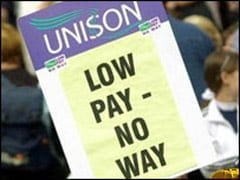This
Friday, the national UNISON Industrial Action Committee meets to discuss their
response to the 55% vote in favour of strike action in local government over
pay. The vote is a clear rejection of Gordon Brown’s pay restraint and reflects
the impact that the economic crisis is having on thousands of UNISON members.
Yet the outcome of this ballot wasn’t a racing certainty by any means. In fact
the initial position of the Local Government Service Group Executive was
particularly muted. On top of that the GMB announced the result of their
consultation on local government pay (which in some cases was restricted to
sounding out branch secretaries) the day that the UNISON ballot began. The GMB
voted overwhelmingly to accept the below inflation deal. UNISON members were
told by the national leadership that they were going to have to agree to
substantial strike action to be able to shift the employer’s position. So in
fact the 55% rejection of the 2.45% offer represents UNISON members sticking
their heels in, despite the position of the GMB and in spite of the lukewarm
approach of the national leadership.
Backed into a corner
We have explained over the past few
months that UNISON members were increasingly being backed into a corner as a
result of rising fuel and food costs. As we explained recently: “The effects of
this debacle are being felt throughout the country in hospitals, schools and
offices delivering essential services to the sick, the young and the old. The camel’s
back is bending under the weight. Sooner or later it’ll snap. Maybe over pay,
maybe over cuts, it depends on events”. Socialist
Appeal UNISON Special June 2008
It’s
obvious that the mood has begun to harden. The 55% vote is the same as that on
the consultative ballot. But it is most likely that those who voted in the
consultation were in general the more active layers. We saw a similar process
last year over pay when the employers came in with a lower offer than the union
had consulted on. The noises coming out of Mabledon Place (UNISON HQ) also
reflect the pressure they are under. It’s no surprise that last weeks delegate
conference voted to consider taking action over mileage allowances and likewise
the possibility of re-opening the negotiations over the Health pay deal
reflects the pressure building up. In similar vein Paul Kenney of the GMB has
talked of a mutinous mood and the GMB have even voted to stop supporting anti
union MPs. Now the PCS have decided to go ahead with a ballot.
The
significance of the possibility of re-opening the Health claim can’t be
underestimated. Reports that we have received indicate that in many hospitals
and other NHS facilities the threat of cuts and redundancies means that for
many people pay has been the least of their worries. In that respect the low
turn out over pay in Health and the 2:1 vote reflected the concerns of the
members. We understand that the leadership in health initially wanted to accept
the employers offer. So pressure is clearly building up.
We’ve had enough of pay restraint
All of
this adds up to a pretty favourable situation to launch a strike over pay. David
Cameron has made it very clear what the Tories position would be. He’s
demanding “tough action” against the unions. We’ve seen the attitude of
Labour’s right wing leaders towards strikes in the past period. The ball now however
is very much in the UNISON’s court. The Industrial Action Committee must vote
to back up the decision of the members. We’ve had enough of pay restraint.
The
union needs a bit of clear leadership. We are fully aware that table thumping
and radical noises from the leadership are one thing, but getting the
bureaucracy to turn words into action is a completely different kettle of fish.
Branches and activists should be putting pressure on the leadership and the
bureaucracy and demanding that we fight for the full claim. After all six per
cent is a very modest demand. Any talk of a “compromise” over a slightly higher
offer would only serve to sell the members short. UNISON should also
urge the GMB to revisit their decision to accept the deal.
We need maximum unity and, to paraphrase Paul Kenny, a Public Sector Pay
mutiny.






